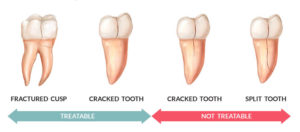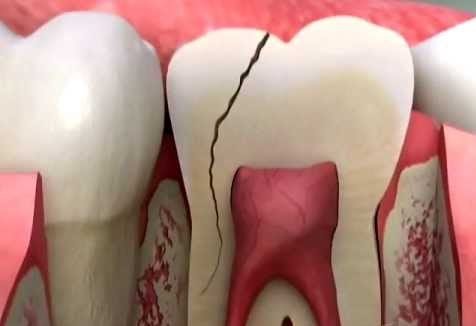It usually happens in a snap. One moment everything is okay with your mouth, the next you realize you have a broken tooth! Biting down on hard food, getting hit or suffering a hard fall are some of the most common reasons why you may get a broken tooth. Sometimes, a tooth that has a cavity or some degree of decay can also cause your tooth to weaken and break.
Once you realize you have a cracked tooth, you immediately need to do something about it. Your tooth should be treated asap to avoid further infections or more severe cracks. And the truth is that only your dentist will be able to tackle this issue. It is not something you will solve on your own at home.
I’ve got a broken tooth. Now what?
Your dentist is the right person to fix your broken tooth. Yet, there are a couple of things you can do until you actually reach the dental office:
– You can rinse your mouth with warm water to wash away food particles or bacteria that may harm your gums and tissues.
– If the fracture is causing you great pain, you may take some over –the- counter pain reliever.
– If your tooth starts bleeding, you will need to stop the bleeding by putting some kind of dental sponge on the damaged area.
– Cold pads or ice on your face right over the broken tooth can prevent or reduce swelling.
However, the most important thing to do is to CALL YOUR DENTIST RIGHT AWAY! A broken tooth, if left untreated, can lead to severe infection and even tooth loss.
Fortunately, the dentist will be there to help you out. Depending on the type and depth of the crack you may expect the dentist to consider different solutions for you.

Small Tooth Cracks
Surface cracks do not mean a big problem. These types of cracks happen when the enamel (the outer layer of your tooth) gets damaged. If you have a minor crack, the dentist will typically polish and smooth the rough part, or use a small filling for minor repairs.
Major Tooth Cracks
Your dentist will need to examine your mouth thoroughly to check whether it is a severe crack or not. For example, a tooth that has split in two is considered a serious fracture. Sometimes, the crack is so deep that it reaches the nerve of the tooth. If the crack has damaged the nerve, you may need a root canal to remove the diseased pulp and prevent severe infections. Sometimes you may need that tooth removed. Other fractures may start at the root and go all the way up to the surface of the tooth.

When your tooth and/or root have been completely damaged, your dentist can suggest different restorative treatments such as dental bonding, dental implants, crowns or caps, or veneers. The solution will depend a lot on your particular situation, needs, and concerns. Also, how your dentist deals with your broken tooth may vary depending on whether it is a broken front tooth or a molar.
Eventually, if the tooth has been severely injured or if it has been weakened by a very deep cavity, your dentist will opt for extracting your tooth. Typically, cracks that go below the gum line will need a tooth extraction. But it is always necessary to make a thorough exam before you and your dentist decide what’s best for you.
So the Bottomline Is…
So the main takeaway is that a broken tooth is not just something you can leave untreated because you don’t want to get major infections or further cracks in your mouth. And while you can take some precautions at home, you should do call your dentist immediately and get the right dental treatment.
